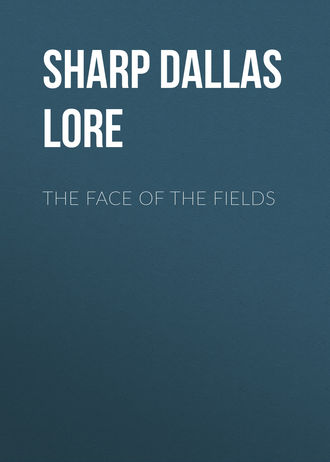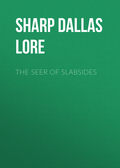
Sharp Dallas Lore
The Face of the Fields
It is all too true. The house, the cow, the children, are all inconvenient. I can buy two quarts of blue Holstein milk of a milkman, typhoid and scarlet-fever germs included, with much less inconvenience than I can make my yellow-skinned Jersey give down her fourteen quarts a day. I can live in a rented house with less inconvenience than in this house of my own. I am always free to go away from a rented house, and I am always glad to go. The joy of renting is to move, or sublet; to be rid also of taxes and repairs.
“Let the risers rot! It isn’t my house, and if I break my neck I’ll sue for damages!”
There is your renter, and the joy he gets in renting.
There are advantages, certainly, in renting; your children, for instance, can each be born in a different house, if you rent; and if they chance to come all boys, like my own, they can grow up at the City Athletic Association – a convenient, and more or less permanent place, nowadays, which may answer very well their instinctive needs for a fixed abode, for a home. There are other advantages, no doubt. But however you reckon them, the rented house is in the end a tragedy, as the willful renter and his homeless family is a calamity, a disgrace, a national menace. Drinking and renting are vicious habits. A house and a bit of land of your own are as necessary to normal living as fresh air, food, a clear conscience, and work to do.
If so, then the question is, Where shall one make his home? “Where shall the scholar live?” asks Longfellow; “In solitude or in society? In the green stillness of the country, where he can hear the heart of Nature beat, or in the dark gray city, where he can feel and hear the throbbing heart of man? I make answer for him, and say, In the dark, gray city.”
I should say so, too, and I should say it without so much oracular solemnity. The city for the scholar. He needs books, and they do not grow in cornfields. The pale book-worm is a city worm, and feeds on glue and dust and faded ink. The big green tomato-worm lives in the country. But this is not a question of where scholars should live; it is where men should live and their children. Where shall a man’s home be? Where shall he eat his supper? Where lay him down to sleep when his day’s work is done? Where find his odd job and spend his Sunday? Where shall his children keep themselves usefully busy and find room to play? Let the Commuter, not the scholar, make answer.
The Commuter knows the dark gray city, knows it darker and grayer than the scholar, for the Commuter works there, shut up in a basement, or in an elevator, maybe, six days a week; he feels and hears the throbbing heart of man all the day long; and when evening comes he hurries away to the open country, where he can hear the heart of Nature beat, where he can listen a little to the beating of his own.
Where, then, should a man live? I will make answer only for myself, and say, Here in Hingham, right where I am, for here on Mullein Hill the sky is round and large, the evening and the Sunday silences are deep, the dooryards are wide, the houses are single, and the neighborhood ambitions are good kitchen-gardens, good gossip, fancy chickens, and clean paint.
There are other legitimate ambitions, and the Commuter is not without them; but these few go far toward making home home, toward giving point and purpose to life, and a pinch of pride.
The ideal home depends very much, of course, on the home you had as a child. I can think of nothing so ideally homelike as a farm, – an ideal farm, ample, bountiful, peaceful, with the smell of apples coming up from the cellar, and the fragrance of herbs and broom-corn haunting storeroom and attic.
The day is past when every man’s home can be his farm, dream as every man may of sometime having such a home; but the day has just arrived when every man’s home can be his garden and chicken-pen and dooryard, with room and quiet and a tree.
The day has come, for the means are at hand, when life, despite its present centralization, can be more as it used to be – spread out, roomier, simpler, healthier, more nearly normal, because again lived near to the soil. It is time that every American home was built in the open country, for there is plenty of land – land in my immediate neighborhood for a hundred homes where children can romp, and your neighbor’s hens, too, and the inter-neighborhood peace brood undisturbed. And such a neighborhood need not be either the howling wilderness, where the fox still yaps, or the semi-submerged suburban village, where every house has its Window-in-Thrums. The Commuter cannot live in the wild country, else he must cease to commute; and as for small-village life – I suppose it might be worse. It is not true that man made the city, that God made the country, and that the devil made the village in between; but it is pretty nearly true, perhaps.
But the Commuter, it must be remembered, is a social creature, especially the Commuter’s wife, and no near kin to stumps and stars. They may do to companion the prophetic soul, not, however, the average Commuter, for he is common and human, and needs his own kind. Any scheme of life that ignores this human hankering is sure to come to grief; any benevolent plan for homesteading the city poor that would transfer them from the garish day of the slums to the sweet solitudes of unspoiled nature had better provide them with copies of “The Pleasures of Melancholy” and leave them to bask on their fire-escapes.
Though to my city friends I seem somewhat remote and incontiguous, still I am not dissevered and dispersed from my kind, for I am only twenty miles from Boston Common, and as I write I hear the lowing of a neighbor’s cows, and the voices of his children as they play along the brook below, and off among the fifteen square miles of treetops that fill my front yard, I see faint against the horizon two village spires, two Congregational spires, once one, that divided and fell and rose again on opposite sides of the village street. I often look away at the spires. And I as often think of the many sweet trees that wave between me and those tapering steeples, where they look up to worship toward the sky, and look down to scowl across the street.
Any lover of the city could live as far out as this. I have no quarrel with the city as a place to work in. Cities are as necessary as wheat-fields and as lovely, too – from twenty miles away, or from Westminster Bridge at daybreak. The city is as a head to the body, the nervous centre where the multitudinous sensations are organized and directed, where the multitudinous and interrelated interests of the round world are directed. The city is necessary; city work is necessary; but less and less is city living necessary.
It is less and less possible also. New York City – the length and breadth of Manhattan – and Boston, from the Fenway in three directions to the water-front, are as unfit for a child to grow up in as the basement floor of a china store for a calf. There might be hay enough on such a floor for a calf, as there is doubtless air enough on a New York City street for a child. It is not the lack of things – not even of air – in a city that renders life next to impossible there; it is rather the multitude of things. City life is a three-ringed circus, with a continuous performance, with interminable side-shows and peanuts and pink lemonade; it is jarred and jostled and trampled and crowded and hurried; it is overstimulated, spindling, and premature – it is too convenient.
You can crowd desks and pews and workbenches without much danger, but not outlooks and personalities, not beds and doorsteps. Men will work to advantage under a single roof; they cannot sleep to advantage so. A man can work under almost any conditions; he can live under very few.
Here in New England – as everywhere – the conditions of labor during the last quarter-century have vastly changed, while the conditions of healthful living have remained essentially as they ever were, as they must continue to remain for the next millennium.
Some years ago I moved into an ancient house in one of the oldest of New England towns. Over the kitchen I found a room that had to be entered by ladder from without. That room was full of lasts and benches – all the kit necessary for shoe-making on a small scale. There were other houses scattered about with other such rooms – closed as if by death. Far from it. Yonder in the distance smoked the chimney of a great factory. All the cobblers of these houses had gathered there to make shoes by machine. But where did they live? and how? Here in the old houses where their fathers lived, and as their fathers lived, riding, however, to and from their work on the electric cars.
I am now living in an adjoining town, where, on my drive to the station, I pass a small hamlet of five houses grouped about a little shop, through whose windows I can see benches, lasts, and old stitching-machines. Shoes were once made here on a larger scale, by more recent methods. Some one is building a boat inside now. The shoemakers have gathered at the great factory with the shoemakers of the neighbor town. But they continue to live in the hamlet, as they used to, under the open sky, in their small gardens. And they need to. The conditions of their work have quite changed; the simple, large needs of their lives remain forever the same.
Let a man work where he will, or must; let him live where only the whole man can live – in a house of his own, in a yard of his own, with something green and growing to cultivate, something alive and responsive to take care of; and let it be out under the sky of his birthright, in a quiet where he can hear the wind among the leaves, and the wild geese as they honk high overhead in the night to remind him that the seasons have changed, that winter is following down their flying wedge.
As animals (and we are entirely animal) – we are as far under the dominion of nature as any ragweed or woodchuck. But we are entirely human too, and have a human need of nature, that is, a spiritual need, which is no less real than the physical. We die by the million yearly for lack of sunshine and pure air; and who knows how much of our moral ill-health might be traced to our lack of contact with the healing, rectifying soul of the woods and skies?
A man needs to see the stars every night that the sky is clear. Turning down his own small lamp, he should step out into the night to see the pole star where he burns or “the Pleiads rising through the mellow shade.”
One cannot live among the Pleiads; one cannot even see them half of the time; and one must spend part of one’s time in the mill. Yet never to look for the Pleiads, or to know which way to look, is to spend, not part, but all of one’s time in the mill.
The dales for shade,
The hills for breathing space,
and life for something other than mere work!
The Commuter is bound to see the stars nightly, as he goes down to shut up the hens. He has the whole outdoors in his yard, with the exception of a good fish-pond; but if he has no pond, he has, and always will have, to save him from the round of the mill, a little round of his own – those various endless, small, inconvenient home-tasks, known as “chores.” To fish is “to be for a space dissolved in the flux of things, to escape the calculable, drop a line into the mysterious realms above or below conscious thought”; to “chore” is for a space to stem the sweeping tides of time, to outride the storms of fate, to sail serene the sea of life – to escape the mill!
Blessed is the man who has his mill-work to do, perfunctory, necessitous, machine-work to do; twice blessed the man who has his mill-work to do and who loves the doing of it; thrice blessed the man who has it, who loves it, and who, besides, has the varied, absorbing, self-asserting, self-imposed labors about his own barn to perform!
There are two things in the economy of unperverted nature that it was never intended, I think, should exist: the childless woman and the choreless man. For what is a child but a woman with a soul? And what is a chore? Let me quote the dictionary: —
“Chore, char, a small job; especially a piece of minor domestic work, as about a house or barn; … generally in the plural.”
A small, domestic, plural job! There are men without such a job, but not by nature’s intention; as there are women without children, and cows without cream.
What change and relief is this small, domestic, plural job from the work of the shop! That work is set and goes by the clock. It is nine hours long, and all in the large or all in the infinitesimally small, and all alike. It may deal with millions, but seldom pays in more than ones and twos. And too often it is only for wages; too seldom is it for love – for one’s self.
Not so this small domestic job. It is plural and personal, to be done for the joy of doing it. So it ought to be with these Freshmen themes that I go on, year after year, correcting; so it ought to be with the men’s shoes that my honest neighbor goes on, year after year, vamping. But the shoes are never all vamped. Endless vistas of unvamped shoes stretch away before him down the working days of all his years. He never has the joy of having finished the shoes, of having a change of shoes. But recently he reshingled his six by eight hencoop and did a finished piece of work; he trimmed and cemented up his apple tree and did a finished piece of work; he built a new step at the kitchen door and did a finished piece of work. Step and tree and hencoop had beginnings and ends, little undertakings, that will occur again, but which, for this once, were started and completed; small, whole, various domestic jobs, thrice halting for him the endless procession, – the passing, the coming, the trampling of the shoes.
And here are the teachers, preachers, writers, reformers, politicians – men who deal, not in shoes, but in theories, ideals, principalities, and powers, those large, expansive, balloonish commodities that show the balloon’s propensity to soar and to explode – do they not need ballast as much as the shoemaker, bags of plain sand in the shape of the small domestic job?
Daring some months’ stay in the city not long ago, I sent my boys to a kindergarten. Neither the principal nor the teachers, naturally, had any children of their own. Teachers of children and mothers’ advisers seldom have. I was forced to lead my dear lambs prematurely forth from this Froebel fold, when the principal, looking upon them with tears, exclaimed, “Yes, your farm is no doubt a healthful place, but they will be so without guidance! They will have no one out there to show them how to play!”
That dear woman is ballooning, and without a boy of her own for ballast. Only successful mothers and doting old grandfathers (who can still go on all fours) should be allowed to kindergarten. Who was it but old Priam, to whom Andromache used to lead little Astyanax?
The truth is, all of the theorizing, sermonizing, inculcating professions ought to be made strictly avocational, strictly incidental to some real business. Let our Presidents preach (how they love it!); let our preachers nurse the sick, catch fish, or make tents. It is easier for the camel, with both his humps, to squeeze through the eye of the needle than for the professional man of any sort to perform regularly his whole duty with sound sense and sincerity.
But ballast is a universal human need – chores, I mean. It is my privilege frequently to ride home in the same car with a broker’s bookkeeper. Thousands of dollars’ worth of stock pass through his hands for record every day. The “odor” of so much affluence clings to him. He feels and thinks and talk in millions. He lives over-night, to quote his own words, “on the end of a telephone wire.” That boy makes ten dollars a week, wears “swagger clothes,” and boards with his grandmother, who does all his washing, except the collars. What ails him? and a million other Americans like him? Only the need to handle something smaller, something realer than this pen of the recording angel – the need of chores. He should have the wholesome reality of a buck-saw twice a day; he might be saved if he could be interested in chickens; could feed them every morning, and every evening could “pick up the eggs.”
So might many another millionaire. When a man’s business prohibits his caring for the chickens, when his affairs become so important that he can no longer shake down the furnace, help dress one of the children, or tinker about the place with a hammer and saw, then that man’s business had better be put into the hands of a receiver, temporarily; his books do not balance.
I know of a college president who used to bind (he may still) a cold compress about his head at times, and, lying prone upon the floor, have two readers, one for each ear, read simultaneously to him different theses, so great was the work he had to do, so fierce his fight for time – time to lecture to women’s clubs and to write his epoch-making books.
Oh, the multitude of epoch-making books!
But as for me, I am a Commuter, and I live among a people who are Commuters, and I have stood with them on the banks of the Ohio, according to the suggestion of one of our wisest philosophers (Josh Billings, I think), and, in order to see how well the world could get on without me, I have stuck my finger into the yellow current, pulled it out, and looked for the hole.
The placid stream flowed on.
So now, when the day’s work is done, I turn homeward here to Mullein Hill, and these early autumn nights I hang the lantern high in the stable, while four shining faces gather round on upturned buckets behind the cow. The lantern flickers, the milk foams, the stories flow – “Bucksy” stories of the noble red-man; stories of Arthur and the Table Round, of Guyon and Britomart, and the heroes of old; and marvelous stories of that greatest hero of them all – their father, far away yonder when he was a boy, when there were so many interesting things to do, and such fun doing them!
Now the world is so “full of a number of things” – things to do still, but things, instead of hands, and things instead of selves, so many things to do them with – even a thing to milk with, now! But I will continue to use my hands.
No, I shall probably never become a great milk-contractor. I shall probably remain only a Commuter to the end. But if I never become anything great, – the Father of my Country, or the Father of Poetry, or the Father of Chemistry, or the Father of the Flying Machine, – why, I am at least the father of these four shining faces in the lantern light; and I have, besides them, handed down from the past, a few more of life’s old-fashioned inconveniences, attended, gentle reader, with their simple old-fashioned blessings.







